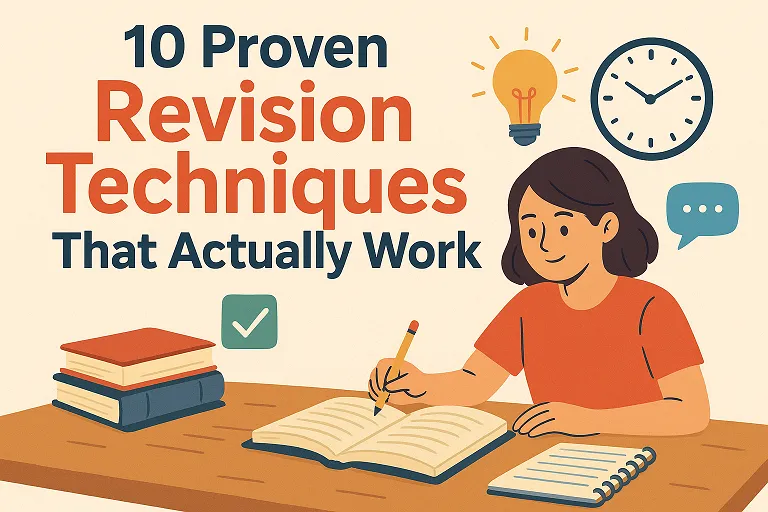How to Create a Daily Study Plan for IGCSE Students: The Ultimate Guide
Struggling to manage your IGCSE revision? Our step-by-step guide shows you how to create a powerful daily study plan backed by science. Learn how to beat procrastination, use active recall, and boost your grades efficiently.
If you’re feeling overwhelmed by the mountain of IGCSE subjects piling up—from Biology to Business Studies—you’re not alone. A recent study by the Cambridge Assessment International Education found that over 60% of students cite time management and stress as their biggest challenges during the IGCSE years.
The good news? There’s a powerful tool to conquer this overwhelm: a well-crafted daily study plan. This isn’t just about scribbling “study chemistry” in a diary. It’s a strategic blueprint for success, designed to maximise retention, minimise stress, and give you back your precious free time. Let’s transform your study habits from chaotic to calculated.
Why a Structured Plan is Your Secret Weapon
In short, a daily plan isn’t a constraint; it’s your ticket to freedom and better grades.
Your 4-Step Guide to a Perfect Study Plan
The Foundation – Audit Your Time & Subjects
You can’t plan where you’re going without knowing where you’re starting from. First, gather your intel.
List & Rank ALL Your IGCSE Subjects:
Label each subject based on your confidence and its difficulty:
- Red: Challenging / High Priority
- Amber: Moderate / Medium Priority
- Green: Strong / Low Priority
Calculate Your Available Time: Be realistic! A school day might offer 5 potential study hours (e.g., 3 PM to 9 PM, minus dinner/breaks). Schedule in hobbies and rest. A plan that ignores your well-being is a plan that will fail.
The Blueprint – Building Your Daily Schedule
Now, let’s build your daily plan using the powerful Time Blocking method combined with these golden rules:
Don’t study similar subjects back-to-back (e.g., Physics then Chemistry) to avoid mental interference. Pair a content-heavy subject (History) with a skills-based one (Math).
Sample Daily Study Plan (Weekday)
| Time | Activity | Subject & Specific Task |
|---|---|---|
| 3:00 – 3:15 PM | Arrival & Reset | Unpack bag, have a snack, check the plan. |
| 3:15 – 4:00 PM | Study Block 1 | Physics (Red): Learn 3 new formulas for motion. Create flashcards. |
| 4:00 – 4:15 PM | Break | Walk outside, listen to music. NO PHONE. |
| 4:15 – 5:00 PM | Study Block 2 | History (Amber): Read and make notes on one topic (e.g., The Treaty of Versailles). |
| 5:00 – 5:15 PM | Break | Get a drink, stretch. |
| 5:15 – 6:00 PM | Study Block 3 | Math (Red): Complete 10 practice problems on algebra. |
| 6:00 – 7:00 PM | Dinner & Relax | No studying! |
| 7:00 – 7:45 PM | Active Recall | Use flashcards from Physics Block 1 to test yourself. |
| 7:45 – 8:00 PM | Break | Quick tidy. |
| 8:00 – 8:45 PM | Study Block 5 | English (Amber): Plan and write one essay paragraph. |
| 8:45 – 9:00 PM | Wind Down | Tidy desk, review what you accomplished, finalize plan for tomorrow. |
The Tools – From Analog to Digital
Your plan is only as good as your ability to stick to it. Choose a tool that works for you:
- The Paper Planner: Writing things down can enhance memory. Great for those easily distracted by devices.
- Digital Calendar (Google/Apple): Perfect for reminders and color-coding subjects. Easily block out time and set alerts.
- Productivity Apps (Notion/Todoist): Fantastic for creating templates, checking off tasks, and syncing across devices.
Pro Tip: Whatever you choose, keep it visible! Put it on your wall or set it as your phone’s home screen.
Advanced Strategies – The IGCSE Zone Edge
To make your plan truly effective, integrate these proven study techniques:
Active Recall > Passive Reading: Don’t just re-read. Test yourself. Close your book and explain a concept out loud. Studies show this is 50% more effective than passive review.
Spaced Repetition: Review information at increasing intervals (e.g., Day 1, Day 3, Day 7). Apps like Anki automate this, but you can build it into your plan manually.
Past Papers are King: Block out a 2-hour slot on weekends to do a timed past paper. This is the single most important practice for IGCSE success.
The Most Important Step: Be Kind to Yourself
Your plan is a guide, not a prison. Some days you won’t stick to it perfectly. That’s okay! The goal is consistency, not perfection. If you miss a block, just adjust and carry on.


